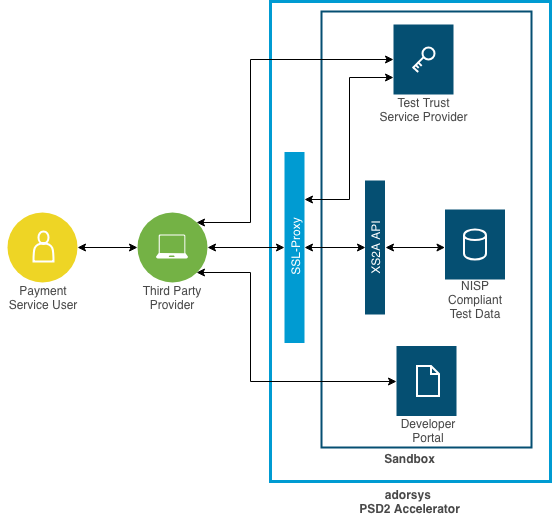This project is obsolete and not supported any longer.
For the actual and modern version of Sandbox please refer to our XS2A-Sandbox.
Figure 1.1: Components of the PSD2 Accelerator
According to the law every bank must provide a sandbox so that TPPs can begin integrating against it. The adorsys PSD2 Accelerator is a full implementation of this sandbox. It provides an XS2A API which is compliant to the Berlin Group XS2A spec (Version 1.3).
Besides the actual interface, PSD2 instructs banks to offer a technical documentation free of charge containing amongst others, information about supported payment products and payment services. That documentation is provided by us as well.
In order to access the XS2A services a TPP has to register at its National Competent Authority (NCA) and request an QWAC certificate from a Trust Service Provider (TSP). The PSD2 Accelerator allows TPPs to create test certificates by themselves so they can access the API. The certificates are valid QWAC certificates, signed by a custom PSD2 Accelerator CA.
The PSD2 Accelerator project bundles the described PSD2 components created at adorsys. The project is a self contained application which enables customers to provide a PSD2 compliant API for testing.
For more details about the PSD2 Accelerator and PSD2 see:
- our architecture documentation
- our PSD2 landing page
- the PSD2 directive
- the XS2A spec
- the NextGenPSD2 Implementation Support Programme
Images are release to DockerHub
| Artifact | Image Name |
|---|---|
| sandbox | adorsys/psd2-sandbox:$VERSION |
| ssl-proxy | adorsys/psd2-sandbox-ssl-proxy:$VERSION |
NOTE:
In order to be able to use virtual hosts in development we use *.vcap.me hostnames, which always resolve to 127.0.0.1
To build (and run) the service and the UI the Makefile can be used. The following commands are supported:
-
First of all you should check if all build dependencies are installed
$ git clone https://github.com/adorsys/psd2-accelerator.git $ cd psd2-accelerator $ make check -
Build the arc42 docs, service and UI application
$ make
-
Build and run the application
$ make run
- starts the ssl-proxy on port 8443 with vhosts for
- XS2A API (with SSL authentication) (https://api.psd2-accelerator.vcap.me:8443)
- Developer Portal (https://portal.psd2-accelerator.vcap.me:8443/app)
- starts XS2A API on port 8080 (http://localhost:8080)
- starts the Developer Portal on port 8081 (http://localhost:8081/app)
- starts the ssl-proxy on port 8443 with vhosts for
-
Run tests
$ make test -
Clean
$ make clean
-
Help
$ make help
$ cd sandbox
$ docker-compose up -d db
$ cd service
$ mvn clean package
# start app - `dev` profile use DB on localhost and enables migration on startup
$ java -jar -Dspring.profiles.active=dev target/sandbox-*.jar- XS2A API will be available at http://localhost:8080
- Developer Portal will be available at http://localhost:8081/app
NOTE: The Maven build embeds the last successful UI build into the JAR. The Makefile handles the correct build order for you.
See the service README.md for mor details.
After starting the Spring Boot application you can run the Angular dev server against the service:
$ cd ui
$ npm install
$ npm start- Developer Portal will be available at (http://localhost:4200/)
- Certificate Service will be available at (http://localhost:4200/app/certificate-service)
NOTE: The service must be running locally because Angular CLI proxies localhost:4200/api -> localhost:8080
See the UI README.md for mor details.
You can start the ssl-proxy and DB with docker-compose and run everything against a local instance of the service.
NOTE: Make sure, your local instance of XS2A is already running (Started in your IDE or as JAR)
$ XS2A_INTERNAL_URL=http://host.docker.internal:8080 docker-compose up --no-deps ssl-proxy dbYou can also run it against the angular-cli proxy when working on the UI:
$ XS2A_INTERNAL_URL=http://host.docker.internal:4200 docker-compose up --no-deps ssl-proxy dbRelease images are built on tag on Travis CI and pushed to DockerHub. Tags must follow the semver format. There is a helper script which patches the right files (pom.xml/package.json) and creates the commits and tags locally.
# create a tag v1.1.0 and then bump to 1.2.0-SNAPSHOT
$ ./infrastructure/build/release.sh 1.1.0 1.2.0
[...]
# review everything locally before publishing!
$ git push --follow-tags --atomicDon't. Fail forward, create a new release and tell everybody you messed up. Won't happen again.
This project is licensed under the Apache License version 2.0 - see the LICENSE.md file for details.

